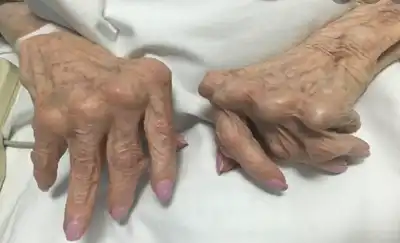
What is Rheumatoid Arthritis (RA)?
Rheumatoid Arthritis (RA) is a chronic autoimmune disease in which the body’s immune system mistakenly attacks the joints, leading to pain, swelling, stiffness, and reduced mobility.

Normally, the synovium (joint lining) produces fluid that nourishes and lubricates the joints. In RA, this lining becomes inflamed, damaging the cartilage, bone, muscles, ligaments, and tendons over time. This results in joint erosion, deformities, and loss of function.
RA affects the most important joints in the body, including joints in the:
- Hands
- Feet
- Wrists
- Elbows
- Knees
- Ankles
If left untreated, RA can not only cause progressive joint damage and disability but may also affect other organs like the heart, lungs, and blood vessels. Early diagnosis and treatment are crucial to control inflammation and prevent long-term complications.
Signs and Symptoms of Rheumatoid Arthritis
Signs and symptoms of RA usually occur in the wrists, hands, or feet and include:
- Pain, swelling, and stiffness in more than one joint
- A low-grade fever
- Appetite loss
- Weight loss
- Tiredness
- Dry eyes
- Chest pain
Causes of Rheumatoid Arthritis
There are several causes of rheumatoid arthritis, though the exact cause is still unknown. It is considered an autoimmune disorder, where the body’s immune system attacks healthy tissue. It can happen for various reasons, such as genetics or exposure to certain viruses or bacteria.
Environmental factors also play a role in the growth of rheumatoid arthritis. For example, people with chronic smoking have a higher risk of developing the condition. Additionally, women are more likely to develop rheumatoid arthritis than men.
The symptoms of rheumatoid arthritis typically begin gradually and worsen over time. In severe cases, rheumatoid arthritis can lead to joint deformities and organ damage. Rheumatoid arthritis cannot be cured, but the treatments available can help reduce symptoms.
4 Stages of Rheumatic Arthritis
Stage 1- Mild RA
During the initial phases, inflammation occurs in your joint lining or synovium. At this point, the bones remain undamaged. However, the surrounding tissue frequently swells, resulting in stiffness and pain in your joint.
Stage 2- Moderate RA
At this moderate stage, inflammation damages cartilage, the cushioning material that safeguards the ends of your bones. As a result, your joint will become stiff, and you’ll experience a limitation in your ability to move it as much as you used to.
Stage 3- Severe RA
This is the advanced stage. Inflammation is deteriorating cartilage and leading to bone erosion near your joints. As the bones shift, your joints may become less stable, and deformities may appear. You will experience reduced muscle strength, pain, swelling, and limited motion.
Stage 4- End-stage RA
In the final stages, the inflammatory process stops, but the detrimental effects persist. Consequently, the affected joint may become nonfunctional, leading to pain, swelling, stiffness, and limited motion. Additionally, muscle weakness may also be experienced. At this point, joint replacement surgery may be necessary.
How Rheumatoid Arthritis is Diagnosed:
Diagnosing RA involves a combination of clinical evaluation, medical history, blood tests (such as rheumatoid factor and anti-citrullinated protein antibodies), and imaging studies like X-rays and MRI scans.
- Lifestyle Adjustments: In addition to medications, lifestyle modifications like regular exercise, joint protection techniques, and a balanced diet can help manage the symptoms and improve the overall quality of life for individuals with RA.
- Rheumatoid Nodules: Some people with RA may develop small lumps called rheumatoid nodules under the skin. These typically form near joints or pressure points and are usually non-cancerous.
- Prognosis: The course of RA varies from person to person. Early diagnosis and aggressive treatment are crucial in controlling the disease and preventing joint damage. Many people with RA can lead relatively normal lives with the right treatment plan.
- Complications of Rheumatoid Arthritis: Untreated or inadequately managed RA can lead to complications such as joint deformities, joint erosion, and even damage to organs like the heart, lungs, and blood vessels.
- Research: Ongoing research into the causes of RA and the development of new treatments, including biologic medications and targeted therapies, continues to advance our understanding of this disease.
It’s important for individuals who suspect they may have RA to seek medical attention promptly, as early intervention can make a significant difference in managing the condition and preventing long-term joint damage. A rheumatologist is a medical specialist who can provide a comprehensive evaluation and manage the treatment of rheumatoid arthritis.
Homoeopathic Management of Rheumatoid Arthritis
Homeopathy is a complementary and alternative system of medicine that is based on the principle of “like cures like.” It involves using highly diluted substances that, in larger doses, would produce symptoms similar to those of the ailment being treated. Homeopathic remedies are individualized based on a person’s specific symptoms, and treatment is holistic, aiming to address the whole person rather than just the disease. Keep in mind that the efficacy of homeopathic treatments for rheumatoid arthritis (RA) has not been scientifically proven, and the use of homeopathy should be discussed with a qualified homeopathic practitioner. Here are some homeopathic remedies that are sometimes considered for RA:
- Rhus Toxicodendron: This remedy is often used for joint pain and stiffness that worsens with initial movement but improves with continued motion. It may be recommended for patients whose pain is worse in cold and damp conditions.
- Bryonia Alba: Bryonia is considered when there is intense pain and inflammation in the joints, which worsens with any kind of movement. The person may find relief with rest and applying pressure to the painful area.
- Apis Mellifica: Apis is used when joints are red, hot, and swollen. It’s indicated for cases where there is a stinging or burning sensation in the joints.
- Arnica Montana: Arnica may be recommended for general pain and soreness, especially after overexertion or physical trauma. It can help with muscle and joint pain.
- Colchicum Autumnale : Colchicum is considered when there is severe pain and swelling in the joints, especially in the finger joints. The pain is worsened by the slightest touch.
- Ledum Palustre: Ledum is often used for pain that starts in the feet or ankles and moves upwards. It may be helpful for people who experience cool joints and feel better with cold applications.
- Causticum: Causticum is indicated when there is muscle weakness, tearing pain in the joints, and a sensation of stiffness. It may be considered for individuals with contractures in the joints.
- Kalmia Latifolia (Kalmia): Kalmia may be used when there is pain that radiates down the arm or leg from the affected joint. It’s associated with stiffness and inflammation.
It’s essential to consult with a qualified homeopathic practitioner who can conduct a detailed evaluation of your symptoms and provide personalized treatment. Keep in mind that while some people report relief from homeopathic remedies, scientific evidence supporting their efficacy in treating RA is limited, and conventional medical treatments remain the primary approach for managing this condition. Always inform your medical doctor about any complementary or alternative treatments you are considering, ensuring there are no contraindications or interactions with your current medical regimen.
Why choose Dr. Sanjay’s Homoeopathy for Rheumatoid Arthritis treatment in Lucknow, India?
Dr. Sanjay’s Homoeopathy is a trusted clinic for safe and effective Rheumatoid Arthritis treatment in Lucknow, India. With years of expertise, Dr. Sanjay is one of the best Rheumatoid Arthritis treatment Doctors in Lucknow, India, and offers specialized homeopathic treatment that helps manage joint pain, stiffness, swelling, fatigue, and restricted mobility naturally, without side effects. As a leading homeopathic doctor in Lucknow, he follows international treatment standards and offers personalized care that focuses on reducing inflammation, strengthening joints, and improving overall quality of life. Patients choose Dr. Sanjay’s Homoeopathy for its holistic healing, long-lasting relief, and compassionate approach in managing autoimmune conditions like Rheumatoid Arthritis.


